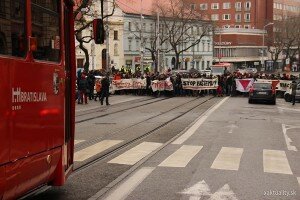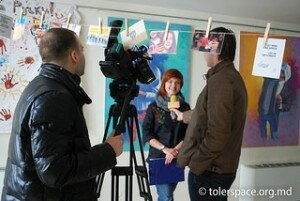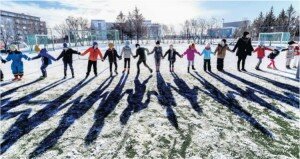Best Practices – Examples of Successful and Creative Action
Nice Events and actions with a big impact you can also organise easily !
Iceland – Human Chains
organised by Icelandic Human Rights Centre
At 11:00 on 17th March, children in primary schools all over Iceland formed human chains around their school buildings in a display of solidarity against discrimination.
The activity was organised by the Icelandic Human Rights Centre as part of its programme for the 2015 European Action Week Against Racism. The organisation sent a group email to the headteachers of all primary schools in the country, as well as phoning as many of them, as they had time for. Many of the headteachers emailed sent replies, and all of those that were phoned reacted positively. Attached to the email were educational materials about diversity, discrimination and racism for teachers to use in class, with the human chain as a fun activity to get the children engaged with the subject. Overall 30 schools took part, with 6500 children standing hand in hand for diversity. This represents around 15% of all primary school pupils in Iceland. The police were happy for the activity to go ahead without any supervision, after organisers contacted them to check if any safeguarding measures were necessary.
The human chain activity itself was highly successful, generating a lot of attention and awareness throughout the country, and creating a number of striking images of children standing hand in hand around their schools. Some of the schools involved were very small, and didn’t have enough children to make a full ring around the building; in these cases, teachers made the activity into a game, with the children linking hands to form hearts and other symbols in the schools’ playing fields.
The activity was covered widely in the Icelandic media: http://tinyurl.com/ottauaz, http://tinyurl.com/mete9vv, http://tinyurl.com/n9o8th8 and was featured on the front page of Frettabladid, the most popular newspaper in Iceland. It also proved a hit on social media: a UNITED Facebook post about the activity received over 200 likes.
Reflecting on the activity, Fríða Rós Valdimarsdóttir of the Icelandic Human Rights Centre said that it had been a huge success, and that the organisation would repeat the activity next year. She highlighted the fact that it required low levels of funding and easy to organise, yet made a big impact in the media because so many children were involved. In future, she said, the organisation would like to involve even more schools and nurseries, as well as high profile figures such as mayors and other politicians.
ORBIT / Netwerk Racisme Keren decided to mark the Action Week Against Racism in a unique way: by filling a gap in the market for guided tours of Brussels. “Discover Diverse Brussels” was a competition for tour operators to come up with a tour of the Belgian capital that focused on the city’s ethnic diversity – as well as the racism and discrimination suffered by minorities.
The organisers started preparing for this activity by constituting a 4-member jury, made up of two established Brussels-based tour guides with a background in multiculturalism, a member of the national equality body and a person with a migrant background. The jury helped to finalise the rules of the competition, which included the criteria to be used for evaluating the tours.
Next, the competition was promoted, mainly focusing on tour operators in Brussels and organisations active in the field of intercultural action. The organisers set a deadline of 15th November for submissions, which had to include a title, a short description of the tour, a map of the tour, and a transcription of the text that the guide would say to the participants.
From these submissions, the three best tours were chosen for a shortlist, and in February the jury sampled each of these three tours. The jury used the evaluation criteria to select a winner. On the 25th March, the prize ceremony was held. Firstly, all three shortlisted tours were given to a larger audience. This was followed by a performance by the stand-up comedian Arbi El Ayachi, and finally the announcement of the winner and a reception.
All three tours were rewarded with prizes – the first prize was a free training for guides, while the runners-up were given books on the subject of multiculturalism. All three tours will also be promoted online and in tourist information centres in Brussels.
The organisers hope that by encouraging operators to offer such tours, an anti-racist message will be spread to a large number of people who might not otherwise think to participate in such activities. They believe that in the long term, such tours will be able to play an active part in the fight against racism by engaging school groups and tourist organisations.
14th March is the anniversary of the foundation of the First Slovak Republic, the Nazi puppet state in Slovakia during the Second World War. Every year, Slovakian neonazis gather in Bratislava to march in celebration of the state and its leader Jozef Tiso. Luckily the group Bratislava bez náckov (Bratislava Without Nazis) was there this year to protest against the march.
 In the days before the neonazi rally, the group organised a positive campaign to engage the public in the fight against racism and fascism. The activities organised included the screening of the documentary film about the horrors of Nazism Night Will Fall, which was followed by a discussion on the question of “hatred as folklore”. Participants in the discussion included Slovakian artist and filmmaker Tomáš Rafa, whose work deals with racism, nationalism and a host of other political and social themes, as well as Sergej Danilov, a former journalist dealing with the issue of extremism and co-founder of the campaign Sport Connects. Together they talked about the trend of rising nationalism, racism, anti-Semitism, Islamophobia and other manifestations of hatred in our society, asking whether hatred has become part of Slovakia’s folklore.
In the days before the neonazi rally, the group organised a positive campaign to engage the public in the fight against racism and fascism. The activities organised included the screening of the documentary film about the horrors of Nazism Night Will Fall, which was followed by a discussion on the question of “hatred as folklore”. Participants in the discussion included Slovakian artist and filmmaker Tomáš Rafa, whose work deals with racism, nationalism and a host of other political and social themes, as well as Sergej Danilov, a former journalist dealing with the issue of extremism and co-founder of the campaign Sport Connects. Together they talked about the trend of rising nationalism, racism, anti-Semitism, Islamophobia and other manifestations of hatred in our society, asking whether hatred has become part of Slovakia’s folklore.
There was also the opportunity for participants to create satirical collages with a humorous antiracist and anti-nazi message, which were then publically displayed under a bridge in Bratislava city centre. The choice of location was symbolic, as the bridge is named after the Slovakian National Uprising, which resulted in the end of Nazi rule in the country. There was also a reception at the exhibition with drinks and music.
On 14th March, far-right groups rallied and marched through Bratislava. Bratislava bez náckov coordinated a street blockade to counter the march. Antifascist protesters stood arm-in-arm across the street, holding banners with slogans such as “together against hate”, “no pasarán” and “stop fascism!” According to the group’s blog, the neonazis were protected by a police escort, while antifascist demonstrators were harassed and even arrested by police. However, the blockade was successful in forcing the neonazi rally to deviate from its planned course through the city’s historic centre.
An event in the town of Mikkeli brought migrants together with native Finns for a series of activities on the themes of migration, antiracism and diversity.
As significant parliamentary elections are coming up in Finland on the 19th April, the main event was a panel discussion between representatives of the main Finnish political parties to discuss public policy in relation to migration and integration. In the interest of hearing a wide range of views on the subject, even a representative of the right-wing populist Finns Party was present.
Alongside this, there was also an exhibition of photographs documenting the life of migrant in Finland, as well as a talk about the human rights implications of mass incarceration of people in the United States.
The day’s activities concluded with an Ice Disco, where all participants were invited to take to the ice rink, accompanied by music. This gave the participants the opportunity to relax and get to know each other in a less formal setting – and also allowed some of the migrants present to have their first experience of ice-skating – an important part of Finish culture.
The antiracist media campaign, part of the Roma Matrix project, was created by six partners in five European countries.
The Czech partner was the Brno-based NGO IQ Roma servis, with its “We Are Working” (“My pracujeme “) campaign. The Europe-wide campaign had “See the Person” as its main slogan and was supported by a series of more than 70 public photographic exhibitions all over Europe.
“Together with our other partners from 10 European countries we immediately agreed at the beginning of the project to attempt to create an antiracist Romani campaign in an unusual way for us,” explains Šárka Pólová, who coordinated the campaign in the Czech Republic. “The Romani people who participated right from the start in the planning meetings emphasized that it is necessary to begin presenting them differently than just through traditional images of Romani people dancing or singing, as those have already become cliché.”
Pólová believes the constant depiction of a handful of extraordinary Romani figures tends to enhance majority-society convictions that such positive examples are merely exceptions to the rule. “Everyone agreed that this time we would focus on creating ‘surprisingly positive’ images of Romani people to break down and confront the negative opinions of Romani people we experience here, images that would even be shocking. We want our main campaign and the local ones to be amusing and fresh – not to prompt a feeling of guilt in others, but to offer the belief that it is possible to live together, to offer solutions,” she said.
That is why, for example, a set of posters on display in the northern Italian city of Bologna is attempting to convince the majority population that even though there is no doubt that there are differences between people with different traditions, in everyday life we are all very similar. The Romani people are depicted along with testimonies about their everyday habits that are essentially identical to those of the rest of the Italian population; the posters urge others “not to look for differences where they don’t exist”.
The creative concept of the campaign in Hungary was based on video spots in which the main characters are wearing unusual masks and looking forward to being treated equally and normally in various life situations (at school, in a shop, at work). The video spots end with the actors removing their masks and revealing to the viewer that they are Romani.
The clips were designed to support the main message of the campaign, which is that there really should be no barriers to social inclusion of people irrespective of their ethnicity. As for the Bulgarian version of the campaign, it uses the strong slogan “We Are No Exception” to demonstrate that the positive examples of successful, working Romani people are not isolated cases, but that there are many such Romani people.
The idea for that campaign came directly from a group of health mediators who decided to combat the racist insults that they regularly are subjected to despite their undeniable professional abilities and qualifications. A series of billboards in the south Bulgarian city of Varna reminds the public that “We All Have Our Dreams”.
The Romani children depicted on those billboards are dressed up in the uniforms of the professions they dream of becoming. In the Czech Republic, the campaign “We Are Working” focuses more closely on the negative prejudices and stereotypes that prevent Romani people from finding employment.
Through six public service announcements on television, special websites, radio spots and programs and a billboard and poster campaign, the Czech campaign presented the positive experiences of employers with their Romani employees and endeavoured to demonstrate, to other employers and the general public, that employers do exist in the Czech Republic who are willing to publicly announce that they employ Romani people and that they have no concerns about accepting them. Six clients of IQ Roma servis found new jobs thanks to the job boards at www.mypracujeme.cz, where Romani job-seekers are able to directly post their profiles.
On 22nd March, the Informal education centre Diversity, Tolerance Club in Chisinau organised the 8th edition of its Festival Of Languages.
 This was a great opportunity to learn something new about languages, both those spoken within the borders of Moldova and abroad. Eighteen representatives of different cultures introduced their native languages for the festival guests. Lectors did not follow any strict academic teaching plan. In a friendly atmosphere, lectors presented the uniqueness of their respective cultures through the language in a free mode (dance, songs, and poetry), exposing visitors to the linguistic and cultural diversity of Moldova as well as Europe and Asia. Those representatives of 18 different countries, speaking 18 languages, gave the audience a series of language classes. The event also aimed to give the floor to foreigners to present their languages and culture in an interesting way.
This was a great opportunity to learn something new about languages, both those spoken within the borders of Moldova and abroad. Eighteen representatives of different cultures introduced their native languages for the festival guests. Lectors did not follow any strict academic teaching plan. In a friendly atmosphere, lectors presented the uniqueness of their respective cultures through the language in a free mode (dance, songs, and poetry), exposing visitors to the linguistic and cultural diversity of Moldova as well as Europe and Asia. Those representatives of 18 different countries, speaking 18 languages, gave the audience a series of language classes. The event also aimed to give the floor to foreigners to present their languages and culture in an interesting way.
The ComiX4= Comics for Equality project aims to foster intercultural dialogue in order to combat racism, xenophobia and discrimination in Europe, with a particular focus on Italy, Bulgaria, Estonia, Romania and Latvia. In order to achieve this aim, the project seeks to involve migrants and second-generation immigrants – often the subjects of discrimination – in the creation of artistic resources – namely comic strips – to be used in combating racism and xenophobia.
The main activities include the ComiX4= Comics for Equality Award (a competition to award the best unpublished comics by authors with migrant backgrounds); the interactive website www.comix4equality.eu ; an eighty-page catalogue containing the best comics submitted within the award; a “Comics Handbook” for use in conducting informal creative workshops; a travelling exhibition of the comics; and comic strip workshops to be held across Europe.
The ComiX4= Comics for Equality project is based on the need to promote the development of a European society based on respect for fundamental human rights, and to fight against racism, xenophobia and other related forms of intolerance. This is more important than ever due to ongoing European enlargement, and to European countries’ key roles as destinations for migrants from both outside and within other European states. The most effective way of achieving this goal is to promote mutual understanding and dialogue.
The project ComiX4= Comics for Equality is led by Africa e Mediterraneo (Italy), in partnership with NGO Mondo (Estonia), the Workshop for Civic Initiatives Foundation (Bulgaria), ARCA (Romania) and Grafiskie stasti (Latvia).
This is an excellent example of how to engage the general public with the issues of racism and discrimination.


